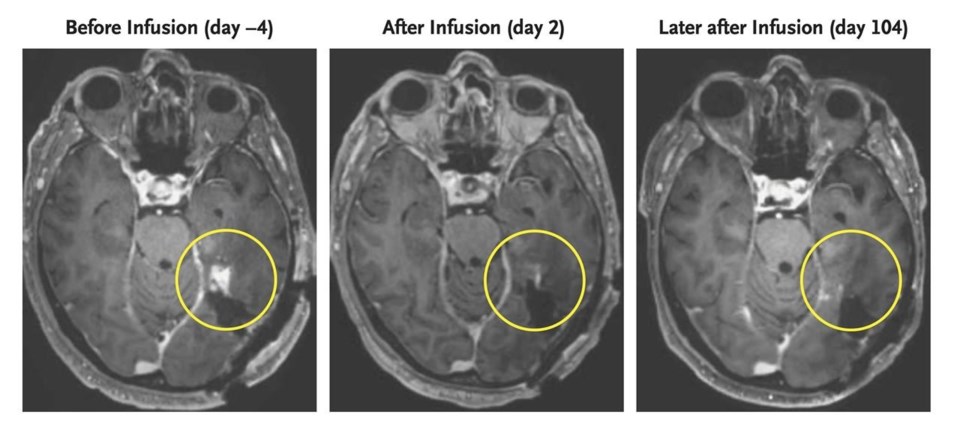WASHINGTON (AP) ŌĆö A new strategy to fight an extremely aggressive type of brain tumor showed promise in a pair of experiments with a handful of patients.
Scientists took patientsŌĆÖ own immune cells and able to recognize and attack glioblastoma. In the first-step tests, those cells shrank tumors at least temporarily, researchers reported Wednesday.
So-called CAR-T therapy already is used like leukemia but researchers have struggled to . Now separate teams at Massachusetts General Hospital and the University of Pennsylvania are developing next-generation CAR-T versions designed to get past some of glioblastomaŌĆÖs defenses.
ŌĆ£ItŌĆÖs very early days,ŌĆØ cautioned PennŌĆÖs Dr. Stephen Bagley, who led one of the studies. But ŌĆ£weŌĆÖre optimistic that weŌĆÖve got something to build on here, a real foundation.ŌĆØ
Glioblastoma, the brain cancer that killed President Joe BidenŌĆÖs son Beau Biden and longtime Arizona Sen. John McCain, is fast-growing and hard to treat. Patients usually live 12 to 18 months after diagnosis. Despite decades of research, there are few options when it returns after surgery and radiation.
The immune system's T cells fight disease but cancer has ways to hide. With CAR-T therapy, doctors genetically modify a patientŌĆÖs own T cells so they can better find specific cancer cells. Still, solid tumors like glioblastoma offer an additional hurdle ŌĆö they contain mixtures of cancer cells with different mutations. Targeting just one type allows the rest to keep growing.
Mass General and Penn each developed two-pronged approaches and tried them in patients whose tumors returned after standard treatment.
At Mass General, Dr. Marcela MausŌĆÖ lab combined CAR-T with what are called T-cell engaging antibody molecules ŌĆö molecules that can attract nearby, regular T cells to join in the cancer attack. The result, dubbed CAR-TEAM, targets versions of a protein called EGFR thatŌĆÖs found in most glioblastomas but not normal brain tissue.
PennŌĆÖs approach was to create ŌĆ£dual-targetŌĆØ CAR-T therapy that hunts for both that EGFR protein plus a second protein found in many glioblastomas.
Both teams infused the treatment through a catheter into the fluid that bathes the brain.
Mass General tested three patients with its CAR-TEAM and brain scans a day or two later showed their tumors rapidly began shrinking, the researchers reported in the New England Journal of Medicine.
ŌĆ£None of us could really believe it,ŌĆØ Maus said. ŌĆ£That doesnŌĆÖt happen.ŌĆØ
Two of the patients' tumors began to regrow soon and a repeat dose given to one of them didnŌĆÖt work. But one patientŌĆÖs response to the experimental treatment lasted more than six months.
Similarly, Penn researchers reported in Nature Medicine that the first six patients given its therapy experienced varying degrees of tumor shrinkage. While some rapidly relapsed, Bagley said one treated in August so far hasn't seen regrowth.
For both teams, the challenge is to make it longer-lasting.
ŌĆ£None of this is going to matter if it doesn't last,ŌĆØ Bagley said.
___
The Associated Press Health and Science Department receives support from the Howard Hughes Medical InstituteŌĆÖs Science and Educational Media Group. The AP is solely responsible for all content.
Lauran Neergaard, The Associated Press



